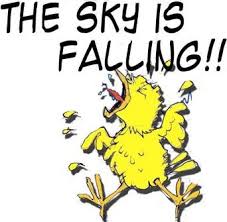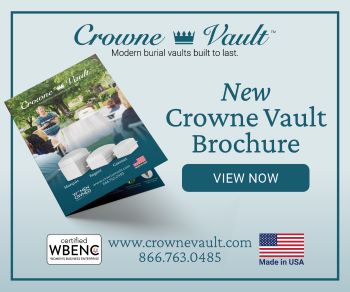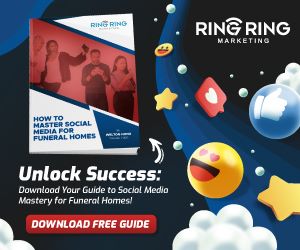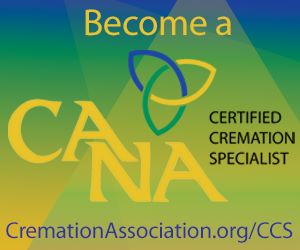The sky is not falling
 I was somewhat amused as I watched this television news report from ABC News 11 in North Carolina. The story is entitled, “For the first time there are more cremations than burials in North Carolina: What is behind the change?” I wasn’t amused due to the story line, what somewhat amused me is the anchor of the news station seeming very surprised by the news that this is happening.
I was somewhat amused as I watched this television news report from ABC News 11 in North Carolina. The story is entitled, “For the first time there are more cremations than burials in North Carolina: What is behind the change?” I wasn’t amused due to the story line, what somewhat amused me is the anchor of the news station seeming very surprised by the news that this is happening.
The anchor eventually asks the reporter something to the nature about “Is this hurting funeral homes?” The reporter then goes into an answer that says, “I don’t see them hurting. . . .they are doing all kinds of other things such as more informal services, wine and cheese receptions, and more”.
While you may not see it if you haven’t been around as long as I have been, but the interaction reminded me of the “old time” funeral director as I was when I started, interacting with someone newer (or an old-timer than can see a new lease on life) in the business who has embraced this change. When I started full-time at our funeral home we virtually did 100% earth burials. . . so much so that I can remember the first family that asked about cremation. . I’m not so sure that we even had prices published for that service at that time.
Contrast that to today – 40 years later – and we live in a cremation world of over 60%. In 1980, if you had told me that figure, I would have told you we would be out of business before the rate got that high. However, we have changed with the time and consumer preferences and have learned how to adapt to be profitable in a world of 60% cremation.
The sky is not falling. . . . .increased cremation can be a great opportunity. You just have to understand that it is coming. . .or has came. . . . and adept your perception to that business reality. How do you define your business? Are you still just in the “funeral” business? If so, you are missing a lot of business by not being a “Death Care provider”. Pushing “funerals” will, over time, lead non-funeral, death care consumers away from you.
It’s important how you see yourself and your business. The public notices. I think of the old standard business school teaching about the railroads of the 1920’s, 1930’s, and 1940’s. They dominated passenger travel. And, they’ve done okay going forward by moving America’s agriculture, consumer products, and oil, but just think where they might be if in the 1950’s they believed that they were in the “Transportation” business rather than the “Railroad” business. Would we be flying Delta, American, and United today. . . or would we be buying first-class airline tickets on Union Pacific, Norfolk Southern, or Burlington Northern planes?

Tom Anderson
Funeral Director Daily
The railways left a great opening in America for the airlines to fit right into without competition from existing “Transportation” carriers. American consumers, according to the Cremation Association of North America (CANA), selected cremation for 56.1% of its deaths in 2020. And, the expectation is that number will grow to 72.8% in the next decade.
That would leave about 28% of American consumers choosing earth burial, but I also believe some percentage of that number will choose an alternative style such as a Green Burial or recomposition (human composting) that are, as of now, in that 28% number for non-cremations. That would bring the traditional earth burial down to somewhere less than the 28% range.
Yet, even for traditional funeral homes, the sky is not falling. You just have to expand your thinking to make sure you are in the Death Care business. . . .not the funeral business. Expanding that thinking may require different marketing, different scheduling, and different facilities than we have traditionally operated, however, it is a great opportunity.
You’ve been the death care expert in you community. . . . you can continue to be that person . . . but you have to be able to meet today’s consumer and their expectations. It may just take a wider scope of thinking to get you to that point.
The other day we ran an article on Matthews International and how their business has changed. In the video that was presented with the article, one of the people telling of her mission at Matthews, explained the perception of what she does in this fashion, “I help to take people from grief to remembrance”. When I heard that I thought of what a great scope of mission that seemed to be. . . . . it would be inclusionary of almost all things that trained funeral directors do.
I challenge you to widen your scope to find your opportunities.
More news from the world of Death Care:
- Our cemeteries are filling up. Is re-using grave sites the answer? ABC News (Australia)
- New managers, same mission at historic Mount Hebron Cemetery. The Northern Virginia Daily. (VA)
- Unknown, unclaimed remains live in funeral homes indefinitely. The Bulletin (OR)
- Funeral home hosts Camp Med participants. Hickory Daily Record (NC)
Enter your e-mail below t0 join the 2,151 others who receive Funeral Director Daily articles daily:






















David — I agree with you. However, if those changes have been done to keep pace with the changing world of the consumer, I would argue that they are a good thing. Many family funeral homes came into being in the last half of the 19th century out of woodworkers or furniture merchants building caskets at the request of local families. We are now 150-175 years removed from that reality but some of those same families continue to operate business started at that time only because they have been able to adapt and change with the times.
In a small way, the adaptations of the family funeral business reminds me of the Rockefeller business history. The Rockefeller’s wealth came from their idea to refine and ship kerosene oil to “light” the American West. Electricity soon came to the American West and the Rockefeller’s adapted by turning their oil into the fuel that powered Henry Ford’s invention of the automobile. The Rockefellers saw changing consumer habits — using electricity and adopting the automobile over the horse and buggy — and profited from it. Family funeral homes have done the same and need to continue to evolve to make sure that they are relative to American Consumers in the 21st century.
from furniture maker, to coffin maker, to undertaker, to mortician, to funeral director, to event planner, from funeral parlour, to mortuary, to funeral home, to event center, to funeral business, now to death care provider. lots of name changes over time.